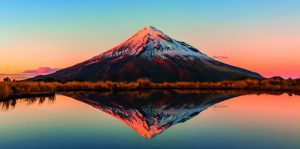In Summer 2020, Council requested an assessment of the Geological Society of London’s historical links to slavery and colonialism. The Society’s Archivist, Caroline Lam, researched those links. The full report is available via this link.

Mount Taranaki, New Zealand. Artists and surveyors of the 1800s depicted the country’s landscapes through a colonial lens
The harrowing deaths of George Floyd and Breonna Taylor in the United States, and the subsequent rise of the Black Lives Matter movement profoundly affected much of society last summer. One of the most notable outcomes has been organisations, such as our own, investigating the extent of links to imperialism, slavery and racism in their past.
The evidence for many of these connections is usually found by surveying institutions’ historical collections, and curators, archivists and librarians are at the forefront of the movement to ‘decolonise’ the more problematic material. Decolonise is a catch-all term to indicate attempts to negate centuries of colonial or imperialistic origins and attitudes that are manifested in historical academic studies and collections. Although the geographical scope of the Society’s collection is wide, there is a distinct lack of diversity in the individuals who created them. The Society’s membership from the first was not diverse. After decades of campaigning, women were finally allowed to join in May 1919 but, as was found in the 2020 Geological Society of London Strategic Options project, the science and ergo the membership to this day continues to display a lack of diversity. The collections are a reflection of this.
